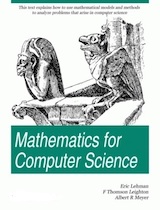
|
FreeComputerBooks.com
Links to Free Computer, Mathematics, Technical Books all over the World
|
|
- Title Mathematics for Computer Science
- Author(s) Eric Lehman, F. Thomson Leighton, Albert R. Meyer
- Publisher: 12th Media Services (June 5, 2017); eBook (Creative Commons Licensed, 2018)
- License(s): CC BY-SA 3.0
- Paperback: 1010 pages
- eBook: PDF (1048 pages)
- Language: English
- ISBN-10/ASIN: 1680921223
- ISBN-13: 978-1680921229
- Share This:

|
This book covers elementary discrete mathematics for computer science and engineering. It emphasizes mathematical definitions and proofs as well as applicable methods. It explores the topics of basic combinatorics, number and graph theory, logic and proof techniques, and many more.
Topics include formal logic notation, proof methods; induction, well-ordering; sets, relations; elementary graph theory; integer congruences; asymptotic notation and growth of functions; permutations and combinations, counting principles; discrete probability.
Further selected topics may also be covered, such as recursive definition and structural induction; state machines and invariants; recurrences; generating functions.
About the Author(s)- N/A
- Discrete and Finite Mathematics
- Graph Theory
- Combinatorics and Game Theory
- Algebra, Abstract Algebra, and Linear Algebra
- Mathematical Logic (Set Theory, etc.)
- Probability and Stochastic Processes

- Mathematics for Computer Science (Eric Lehman, et al.)
- The Mirror Site (1) - HTML and PDF
- The Mirror Site (2) - PDF
- Course Homepage (Video Lectures, Textbooks, Lecture Notes, etc.)
-
 Mathematics for Machine Learning (Marc Peter Deisenroth, et al.)
Mathematics for Machine Learning (Marc Peter Deisenroth, et al.)
This self contained textbook bridges the gap between mathematical and machine learning texts, introducing the mathematical concepts with a minimum of prerequisites. It provides a beautiful exposition of the mathematics underpinning modern machine learning.
-
 Discrete Mathematics: An Open Introduction (Oscar Levin)
Discrete Mathematics: An Open Introduction (Oscar Levin)
This is a gentle introduction to discrete mathematics. Four main topics are covered: counting, sequences, logic, and graph theory. Along the way proofs are introduced, including proofs by contradiction, proofs by induction, and combinatorial proofs.
-
 Discrete Structures for Computer Science: Counting, Recursion
Discrete Structures for Computer Science: Counting, Recursion
This book provides a broad introduction to some of the most fascinating and beautiful areas of discrete mathematical structures with examples in logic, applications of the principle of inclusion and exclusion and finally the pigeonhole principal.
-
 Applied Discrete Structures, Fundamentals (Al Doerr, et al)
Applied Discrete Structures, Fundamentals (Al Doerr, et al)
This book contains most of the fundamental concepts taught in a one semester course in discrete mathematics which is a required course for students in Computer Science, Mathematics and Information Technology.
-
 Discrete Structures, Logic, and Computability (James L. Hein)
Discrete Structures, Logic, and Computability (James L. Hein)
This book contains programming experiments that are designed to reinforce the learning of discrete mathematics, logic, and computability, provides introductions to those ideas and techniques to understand and practice the art and science of computing.
-
 A Spiral Workbook for Discrete Mathematics (Harris Kwong)
A Spiral Workbook for Discrete Mathematics (Harris Kwong)
This is a book on discrete mathematics with an emphasis on motivation. It explains and clarifies the unwritten conventions in mathematics, and guides the students through a detailed discussion on how a proof is revised from its draft to a final polished form.
-
 Mathematics for Computer Scientists (Gareth J. Janacek, et al)
Mathematics for Computer Scientists (Gareth J. Janacek, et al)
The aim of this book is to present some the basic mathematics that is needed by computer scientists. The reader is not expected to be a mathematician and we hope will find what follows useful.
-
 Lists, Decisions and Graphs - With an Introduction to Probability
Lists, Decisions and Graphs - With an Introduction to Probability
In this book, four basic areas of discrete mathematics are presented: Counting and Listing (Unit CL), Functions (Unit Fn), Decision Trees and Recursion (Unit DT), and Basic Concepts in Graph Theory (Unit GT).
-
 Prolog Experiments in Discrete Math, Logic, and Computability
Prolog Experiments in Discrete Math, Logic, and Computability
This book contains programming experiments that are designed to reinforce the learning of discrete mathematics, logic, and computability. The Prolog programming language is the tool used for the experiments in this book.
-
 Isomorphism - Mathematics of Programming (Xinyu Liu)
Isomorphism - Mathematics of Programming (Xinyu Liu)
This book introduces the mathematics behind computer programming. It intents to tell: programming is isomorphic to mathematics. Just like in art and music, there are interesting stories and mathematicians behind the great minds.
-
 Discrete Mathematics for Computer Science (Jean Gallier)
Discrete Mathematics for Computer Science (Jean Gallier)
This book gives an introduction to discrete mathematics for beginning undergraduates. One of original features of this book is that it begins with a presentation of the rules of logic as used in mathematics. Many examples of formal and informal proofs are given.
-
 Discrete Mathematics for Computer Science Students
Discrete Mathematics for Computer Science Students
This book gives thorough coverage to topics that have great importance to computer scientists and provides a motivating computer science example for each math topic. Contents: Counting; Cryptography and Number Theory; Reflections on Logic and Proof.
-
 Exploring Discrete Mathematics With Maple (Kenneth H. Rosen)
Exploring Discrete Mathematics With Maple (Kenneth H. Rosen)
This is is a supplement in discrete mathematics to concentrate on the computational aspects of the computer algebra system Maple. Detailed instructions for the use of Maple are included in an introductory chapter and in each subsequent chapter.





